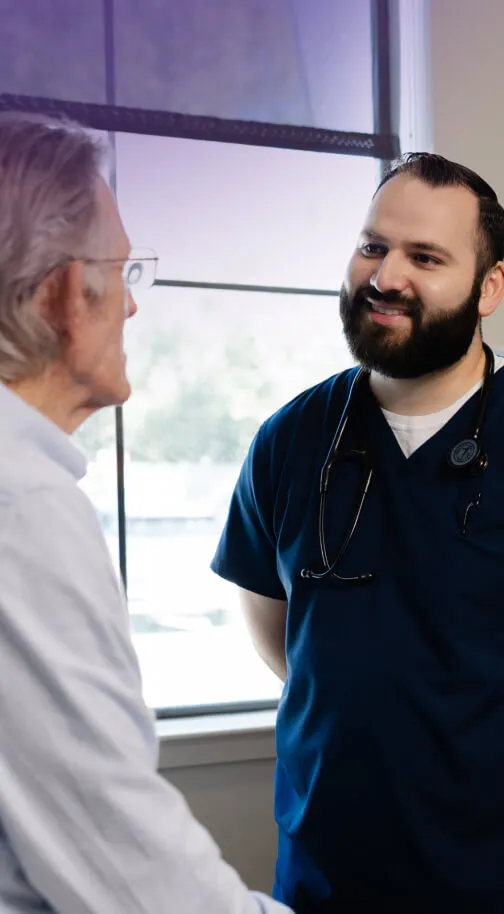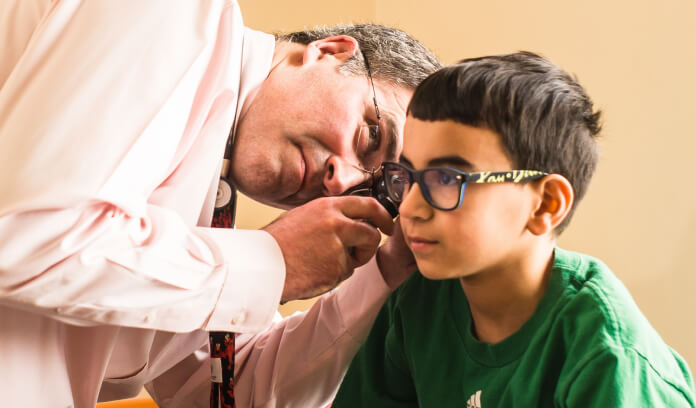Many healthcare providers across the U.S. today are placing renewed focus on quality of care and fostering long-lasting patient relationships. More than one-third (37%) of medical groups report patient no-show rates have increased in 20231, calling more attention to ensuring patients are engaged in their care and wellness programs. Driving patient engagement through quality programs has likewise been at the center of many new care models, especially for practices using value-based care and hybrid models. Similarly, patient centered care, or person centered care, contains the ethos that patient communication and empathy should help guide care providers in clinical decisions and the creation of their care plans.
Patient education and empowerment is a critical factor in patient centered care, and helps drive the values of communication, collaboration, and compassion that many patient-oriented and VBC practices uphold. Taking a patient’s core values, concerns, and viewpoints into account at the point of care can both help keep patients informed and engaged, and also creates a stronger relationship between providers and patients.
Key elements like communication and transparency, collaboration, reducing care gaps, and enabling self-service should all be taken into account when incorporating values of patient centered care into your practice. But what does this look like when applied to clinical encounters and daily workflows? Below, we’ll look at some of the practical applications of patient-centered care to help you implement wisely and effectively.
Patient self-service options to help drive patient satisfaction
A recent study showed that 26% of patients said they’re willing to switch to a new provider for high-quality digital services.2 In many cases, your patients are looking for ways that they can easily and quickly access care, and today that means doing so digitally. Patients want to minimize time spent waiting on hold over the phone, placing critical importance on digital patient engagement in order for practices to thrive.
But how do digital patient engagement and self-serve options ladder up to a patient-centered care approach? Well, your patients want to be able to receive care and communicate with providers quickly and easily, and in a way that’s most convenient for them. Examples of this include scheduling and adjusting appointments via an app on their cell phone, completing intake forms via a convenient link in a text message, using a digital patient portal to message their providers with follow-up questions, and submitting payments easily through their laptop or patient portal.
By leaning into patient self-serve options, your practice is enabled to not only engage patients more effectively over digital surfaces, but also expand and grow through increased appointment volume, with the added benefit of reducing administrative burden on front of office staff.
Care gap outreach campaigns to help provide comprehensive care
In an industry where burnout is rampant, it’s not surprising that 57% of physicians surveyed said they do not feel that they have adequate time to spend with their patients.3 This limited time during patient encounters makes it even harder for healthcare providers to take a holistic approach to care and close care gaps.
With a patient centered care approach, you can leverage care gap outreach campaigns to engage more deeply with patients. Personalized messages to patients help ensure tight patient-provider communication, and that care can be collaborative. This can help you get the buy-in you need from patients, rounding out their care with annual wellness visits, appointment reminders, routine immunizations, proactive testing and screenings, and more. These messaging campaigns not only help you take better care of your patients, but in doing so, they can also help you succeed in any VBC contracts and quality programs that require care gap closure.
Strong communication between in-office visits also helps improve patient engagement and satisfaction, while directing patients to take the actions you want. Touchpoints and milestones for personalized wellness plans created with patients can also be communicated via outreach campaigns, helping patients stay on top of their progress.
When patients are more engaged in their health, that can lead to better health outcomes— an important metric for your organization in an increasingly value-based care world. Outreach campaigns help close care gaps, promote patient loyalty, and strengthen communication, and with automated messages, you can reduce administrative work as well.
Enhanced data-sharing to enable more coordinated, quality care
Almost all (94%) of physicians surveyed agree that getting the right clinical data at the right time is very important.4 But many healthcare providers also struggle to communicate effectively across EHR systems and care teams, and if these providers aren’t coordinating medical information or communicating care plans, this can create gaps in care that have negative effects on the patient. This is why EHR interoperability and tools with enhanced data-exchange are so critical.
With patient centered care, patients should be kept educated about their health progress, their test and lab results, and any other critical information. Medical information should be shared as soon as possible with the patient, along with a detailed explanation of what results mean so that patients can feel informed about their clinical status. Optimizing for interoperability allows systems to incorporate data from across the healthcare ecosystem and allows care coordinators to communicate more quickly and effectively. Tools that proactively surface relevant clinical data at the point of care can help providers make more informed and holistic care decisions, and tailor their personalized wellness plans accordingly.
Effective data-exchange allows for more informed and comprehensive person centered care. Seamless coordination between internal and external care teams ensures that providers always have the most relevant, timely clinical data at their fingertips, and that patients can quickly access results from across the healthcare ecosystem, allowing them to be more engaged as a result.
Expanded access to care with telehealth services
For patient centered care practices that are seeking ways to provide better access to care and increase patient communication, telehealth services provide an effective solution. In fact, there’s been a 23x rise in telehealth utilization since 2020.5 But how does providing telehealth services allow patient centered care practices to thrive?
To start, telehealth allows clinicians to provide more accessible care to patients who otherwise wouldn’t be able to make an in-office appointment. For example, elderly patients, patients with limited mobility, and patients with chronic illnesses are all groups who benefit greatly from providers that offer telehealth as an option. Providers can stay in touch with patients more consistently and provide the comprehensive care they need, fostering stronger patient-provider relationships and patient loyalty.
Telehealth allows you to meaningfully engage with patients and meet them wherever they are, but it also allows you to grow your patient roster and maintain schedule density. By leveraging telehealth services in addition to in-person care, your patient centered care practices can help close care gaps while also growing to accommodate new patients and fitting more appointments in a day.
Digital activation, proactive outreach, self-service tools, and better data sharing can help improve the patient experience for many patient centered care practices. Focusing on tools and services that help effective provider-patient communication and collaboration, close care gaps, and interoperability will allow you to take the next step with your person centered care strategy, and will help your practice see future returns in patient satisfaction and loyalty.
More patient communication resources
Continue exploring
- MGMA, “Patient no-shows holding steady at medical groups in 2023”, August 2023, https://www.mgma.com/mgma-stat/patient-no-shows-holding-steady-at-medical-groups-in-2023
- Accenture, August 2020, How can leaders make recent digital health gains last?; https://www.accenture.com/us-en/insights/health/leaders-make-recent-digital-health-gains-last
- 2023 Physician Sentiment Survey, commissioned by athenahealth and fielded by Harris Poll, Jan 2024
- 2023 Physician Sentiment Survey, commissioned by athenahealth and fielded by Harris Poll, Jan 2024
- Advisory Board, 2023, Understanding Your Customer: Physicians and Medical Groups; https://www.advisory.com/topics/physician/2023/06/understand-your-customer-physicians-and-medical-groups












